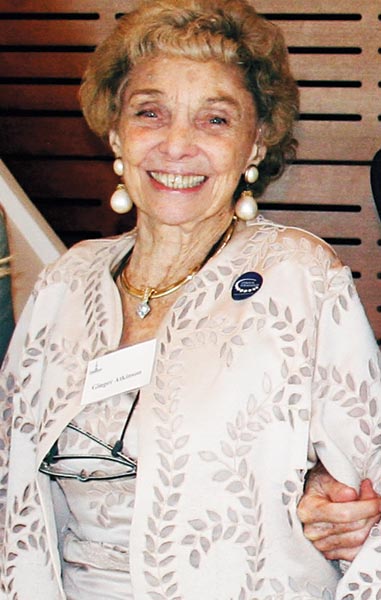Ginger Atkinson: Trials in and out of Court
August 27 - September 2, 2012
The 1950s were not a climate for female professionals, especially attorneys. Virginia “Ginger” Atkinson’s new autobiography, Finding my Niche, details the many trials she struggled with both in court and as a female go-getter.
The namesake of the book comes with a punch; early in her career she moved to Little Rock and was looking for some work as a licensed female lawyer. One of the responses to her inquiry for work was: “Dear Mrs. Ham. Your scholastic achievements are well known and greatly to be admired but there is no place for a woman in our firm. I hope you find your niche.”(page 129).
Ginger not only found her niche, she carved it in such a permanence that she blazed brightly through the state of Arkansas, becoming a college English teacher, a Phi Beta Kappa law school graduate, a prosecutor and defense attorney.
Atkinson never really realized the obstacles that would be before her if she chose to be a “female lawyer.” She thinks back: “I certainly did not set out to be a pioneer, and did not really know I was being one. But for a woman to become an attorney in 1955, as I did, is enough to qualify as a pioneer.”(1)
Atkinson was born in Booneville, Arkansas, on August 13, 1921, and grew up in Russellville. However, before settling down in one place, her parents had a “house car” (14) and her Dad drove all around the south selling The Book of Knowledge. Education was important to her father, as it would be to her: “Always aware that he had been unable to obtain an education, my father believed very strongly that an education was necessary for success”(15).
Traveling and meeting people at a young age led Atkinson to not only be inquisitive, but to conquer everything in her environment. She became a competent typist that would eventually type 100 words a minute at 12 years old when, the Weedins, who taught shorthand at Weedins Business College in Russellville were taken in with her curiosity.
Atkinson met the Weedins when she was charged with picking her older brother John up for class from the school. This skill became very important to her when she became a court reporter before entering Fayetteville’s School of Law.
Like most Southern families, the Harkey children (Virginia and her brother John) learned to read largely on books that happened to be in the hands of their neighbors, as well as the Sears & Roebuck catalog.
During the height of the Depression, Atkinson’s father found that Sears had come up with a scheme for allowing for a college education: “An individual could sign up to promote customers for the company, receiving for his or her efforts money to finance a college education”(35). With success and a little luck Atkinson graduated Russellville High School as Valedictorian and went on to enroll at Arkansas Tech in Russellville, which was only a two-year college at the time, thanks to Sears. She eventually went on to University of Arkansas at Fayetteville to study law, still reaping the benefits on a catalog-funded education.
Atkinson spent some time working as a court reporter before she enrolled in Law School. She tells the story of her finances and her determination as she went to the registrar to enroll for a second semester. She didn’t quite have all the money at one time and asked that she could pay it as soon as she got it. When she was told that the University didn’t allow payment in such a manner she replied, “Well you’re going to this time.”(94). She successfully began her second semester of law school with “borrowed books and postponed tuition”(94).
She graduated with honors in her class and when she was sworn in she was determined to find a job. It took many bumps in the road before she was able to prove to the men around her that she should be taken seriously as a smart, professional woman.
Atkinson says herself that she has a hard time “with respect to marriage”(310). Going through three husbands and raising two children, Gretel and Everett, at the same time as she was working to further her career was a whirlwind for Atkinson. The tale of tragedy and heartbreak can only be experienced truthfully in her own words, however, one thing remains true: she had her children to care for and support throughout it all.
Gretel, Atkinson’s first-born daughter, is proud of her mother’s achievements. “I am really proud of her. I was growing up and she was pushing the boundaries, but to me that was normal. I never imagined that she was out on a limb, I just thought that was the way the world should work.”
Although Atkinson had to work more than was ideal, she spent time with her children on what Gretel calls “adventures.” “I remember one time she took us down to the Southern Pacific round-a-bout. She called whoever she needed to call and we were able to go. We did all kinds of thing like that.”
With her close-knit family, Atkinson was able to handle anything, whether a jury or trying to get the next job in a climate that was not favorable to women. The grand details of her rise from Booneville, Arkansas to conquering the courts of Little Rock is best told in her own words as she describes finding her niche. (Finding My Niche, Ginger Atkinson, Publisher H. K. Stewart Creative Services, 2012, 342 pages.)



